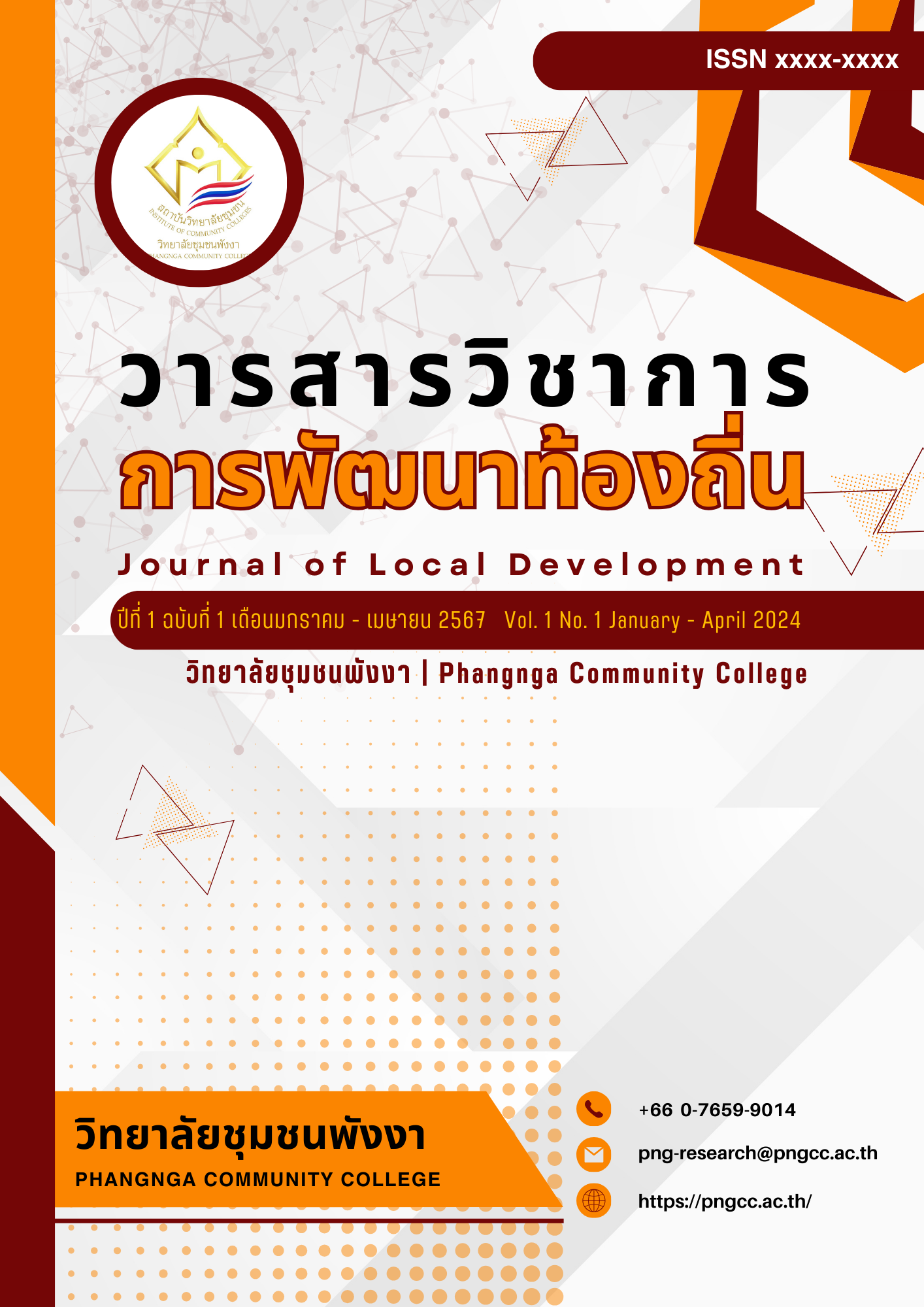Model for Developing Student Competency to Become Smart Farmers Competency Development Model, Student, Smart Farmer
Main Article Content
Abstract
This research aims to develop a model for enhancing the competencies of high-vocational innovation scholarship students in the Associate Degree Program in Agricultural Technology at Phrae Community College to become smart farmers. The research methodology employed a mixed methods research design, combining qualitative and quantitative research methods. The sample consisted of 25 stakeholders involved in the project to develop the potential of high-vocational innovation scholarship students in the Associate Degree Program in Agricultural Technology at Phrae Community College, including administrators, lecturers, students, and agricultural entrepreneurs. The research results revealed a development model called the "PHRAE Model." This model is an integrated model consisting of the following components: P: Plan: A meeting of lecturers to plan student competency development for each semester. H: High Technology: The use of high technology to promote agricultural careers. R: Relationship: Building relationships and networks for experiential learning during the study period. A: Area: Students are required to learn and work in the community with businesses. E: Evaluation: Monitoring students to ensure they have jobs that match their competencies in each semester. The evaluation and validation results of the model showed an overall mean score of 4.43, which exceeded the set criteria. Therefore, it can be concluded that the experts validated the model developed by the researcher.
Article Details

This work is licensed under a Creative Commons Attribution-NonCommercial-NoDerivatives 4.0 International License.
The published article is copyrighted by Phang Nga Community College.
References
กัญชพร ค้าทอง และ ประยุทธ ชูสอน. (2563). กลยุทธ์การบริหารงานวิชาการในยุคไทยแลนด์ 4.0
ของโรงเรียนประถมศึกษา สังกัดสำนักงานเขตพื้นที่การศึกษาประถมศึกษา จังหวัดขอนแก่น.
วารสารสังคมศาสตร์และมานุษวิทยาเชิงพุทธม, 5(3), 446-460.
พรชัย เจดามาน และคณะ. (2560). การพัฒนาการศึกษาภายใต้กรอบประเทศไทย 4.0 สู่ศตวรรษที่ 21.
เรียกใช้เมื่อ 5 มกราคม 2564 จาก
https://www.kroobannok.com/news_file/p81770280746.pdf.
พฤทธิ์ ศิริบรรณพิทักษ์. (2561). การพัฒนากลไกขับเคลื่อนระบบผลิตและพัฒนาครูสมรรถนะสูงสำหรับ
ประเทศไทย 4.0. กรุงเทพฯ: สำนักงานเลขาธิการสภาการศึกษา กระทรวงศึกษาธิการ.
พันธวิชญ์ เลี้ยงชีพชอบ. (2562). ความต้องการจำเป็นในการบริหารวิชาการของโรงเรียนประถมศึกษาตาม
แนวคิดคนไทย 4.0. วารสารวิชาการมหาวิทยาลัยการจัดการและเทคโนโลยีอีสเทิร์น, 16(2), 345-356.
ไพฑูรย์ สินนารัตน์. (2561). การศึกษา 4.0 เป็นยิ่งกว่าการศึกษา. กรุงเทพฯ: สำนักพิมพ์จุฬาลงกรณ์
มหาวิทยาลัย.
ไพฑูรย์ สินลารัตน์. (2562). หลักการพื้นฐานการอุดมศึกษา. กรุงเทพฯ: สำนักพิมพ์จุฬาลงกรณ์มหาวิทยาลัย.
เลอลักษณ์ โอทกานนท์. (2561). มหาวิทยาลัย 4.0: การศึกษาเชิงผลิตภาพ. วารสารบัณฑิตศึกษา
มหาวิทยาลัยราชภัฏวไลยอลงกรณ์ ในพระบรมราชูปถัมภ์, 12(3), 249-265.
วิภาลัย วงษา และคณะ. (2563). คุณลักษณะที่พึงประสงค์ของผู้บริหารโรงเรียนในยุคไทยแลนด์ 4.0
สังกัดสำนักงานเขตพื้นที่การศึกษาประถมศึกษาบึงกาฬ. วารสารการบริหารการศึกษาและภาวะผู้นำ
มหาวิทยาลัยราชภัฏสกลนคร, 9(33), 133-142.
สุวิมล มธุรส และคณะ. (2562). การศึกษาไทย 4.0 ในบริบทของผู้บริหารสถานศึกษา. วารสารวิทยาลัยสงฆ์
นครลำปาง, 8(2), 266-278.
อรขวัญ คุ้มประดิษฐ์ และคณะ. (2557). รูปแบบการพัฒนาสมรรถนะของหัวหน้าหน่วยจัดการศึกษา
สังกัดวิทยาลัยชุมชนในประเทศไทย. วารสารศึกศาสตร์ มหาวิทยาลัยนเรศวร. 16(3), 107-119.
David A. S. (2011). How the brain learns. 4th ed. United States of America: Corwin.


